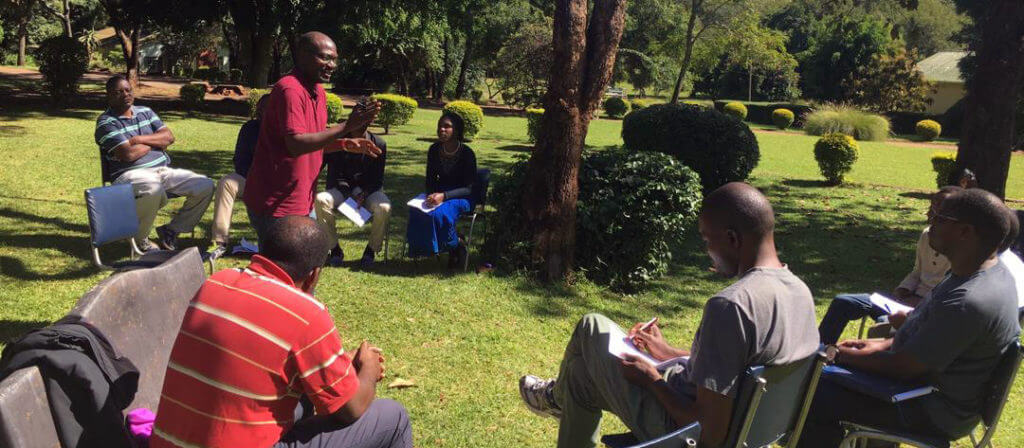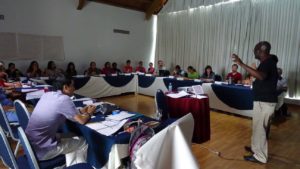A seasoned mobilizer shares his insights
Mercy Kambura

Kehinde Ojo was among the crème de la crème of his university, receiving his training in electrical and electronics engineering. He was even handpicked as a management trainee in one of the highest paying oil companies in Nigeria.
As an industrial training student guaranteed a job in the company, his career path was well-lit and certain. But when the training ended, he didn’t return. Two years later he visited his friends who got the job. They were gobsmacked! Who in his right senses would let such an opportunity slip away?
“I got a better job,” he announced.
He had accepted the call to serve God with the International Fellowship of Evangelical Students (IFES). His role would entail discipleship and mission mobilization among campus students.
 Today, Kehinde is a trainer, consultant, and mentor. After 20 years with IFES Nigeria, he was invited by IFES to pioneer a new global program to help national movements within IFES become sustainable in their local fundraising for ministry effectiveness. Developing a work plan, he recruited a global team to work with him. He trains and mentors leaders regularly in Africa, Eurasia, Caribbean, Latin America, East Asia and South Asia regions of IFES and has provided support for other organizations globally in their effort to become locally sustainable.
Today, Kehinde is a trainer, consultant, and mentor. After 20 years with IFES Nigeria, he was invited by IFES to pioneer a new global program to help national movements within IFES become sustainable in their local fundraising for ministry effectiveness. Developing a work plan, he recruited a global team to work with him. He trains and mentors leaders regularly in Africa, Eurasia, Caribbean, Latin America, East Asia and South Asia regions of IFES and has provided support for other organizations globally in their effort to become locally sustainable.
With a team of 15 facilitators globally, Kehinde conducts trainings in up to a dozen countries annually. No corner of the world is too out-of-the-way for him, with some locations including Fiji, Vanuatu, Guyana, Jamaica, Nepal, and the Gambia.
Three strategies
For mobilization to be effective, Kehinde advises three key strategies for the mobiliser:
- Authenticity
“The most effective strategy for any mobilizer should be authenticity,” he says. “It’s the one thing that always works. As a mobilizer, people want you to be real. The younger generation wants to see you living life and applying the principles you are urging them to follow. “
- Consistency
“Live the principles you teach and pursue the vision you have. Scripture is timeless. Be consistent with your biblical truths and show people the unchanging call to missions.”
- Don’t prescribe actions, ask questions.
“A prescriptive way of getting people to your vision is to tell your experience. Yet, people may not fully identify with your experiences and may not be able to see how they can come in and contribute to the vision.
Instead, let people engage from their immediate situation – how it is applicable to them. With this in mind, they can provide the response.”
Out of the university
Kehinde grew up in southwestern Nigeria. Despite his Christian home and being baptized at eight days old, he only gave his life to Christ while in university. It was not only salvation that he acquired during these formative student years, but also his life’s calling. This came a week before his final examination. “I was very uneasy that Sunday, I even left the service to pray alone in the garden.”
He could feel something was about to happen to shift his life focus, but he couldn’t place a finger on it. During the service, God spoke through the preacher that among the graduates, God was calling one to serve him.
“I was the only one that went forward that day; there was no confusion at all,” he adds.
Thirty-one years later, all his life choices have been shaped by that one decision.
Three resources
For the past nine years, Kehinde’s mandate is to mobilize the national movements of IFES to appreciate the gains of indigenous sustainability. This is done through research, training, mentoring/coaching, and arranging matching grants. As a mobilizer, Kehinde highlights three resources Christians can use in advancing the gospel.
- Time
The common denominator for everyone is time! We all have time in equal proportion. How can some partners who may not have money or skills use their time to serve the ministry? They can primarily use part of their time to pray for the mission and also visit mission partners.
- Talent

Some are very skilled and competent in their professions. These people can volunteer their services to the ministry and provide services that otherwise would have been paid for.
- Treasure
The treasure category may not have time or talent to make available, but they can give resources in cash or materials that can meet the need of the organization.
“Resources of time, talent and treasures are everywhere! Over the years, most ministry leaders have focused on the mobilization of money, at the exclusion of other resources. Leaders need to unpack the availability of these other resources in their immediate environment and release them for ministry enhancement,” he says.

Twenty-nine years later, has he struggled with the decision to join the discipleship and mobilization bandwagon? No, he hasn’t.
“I have not stopped using my engineering knowledge and skills even in my current job; I still apply some engineering principles to make decisions.” The words in 1 Chronicle 29:1 have been a continuous encouragement. King David said to all the assembly: “My son Solomon, whom alone God has chosen, is young and inexperienced; and the work is great.”
